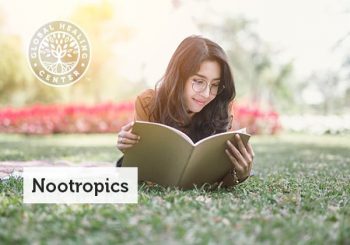Guest Writer for Wake Up World
If you want a nutritional supplement to enhance your brain function — short-term memory, focus, creativity, mood, or motivation — look for a nootropic. The term nootropic comes from the Greek root words nóos (mind) and tropé (turning). Natural nootropics can help older adults stay sharp, students who want to improve their memory for upcoming exams, or busy workers who need a boost of creativity.
[pro_ad_display_adzone id=”110028″]
Having good mental health is more than just the absence of illness. It also involves having a positive mood with enough energy and mental clarity to make the most out of life. That’s not always easy. Daily pressures and environmental toxins can lead to anxiety, fatigue, and brain fog — even when you follow a good diet-and-exercise routine. Supplements are a great way to add specific health-boosting nutrients to your diet so you can optimize your health.
What Are Nootropics?
If you drink coffee or tea to jump-start your day, you’re using a nootropic without realizing it. Nootropics, sometimes called cognitive enhancers, brain boosters, or “smart drugs,” are compounds that affect your central nervous system. They have an enhancing effect on one or more aspects of your mental state. These substances target “executive function,” which means attention, learning, memory, alertness, and motivation.
Nootropics affect the brain in different ways. Some influence your neurotransmitters. Others increase blood flow, oxygen, and nutrient levels in the brain. Others protect you from the effects of toxins and free radicals. Some even promote the growth of new neurons (brain cells) and brain cell connections that help you adapt to change.[1]
Most people know that food gives your body nutrients, such as vitamins and minerals. But most typical modern diets lack variety. Unlike our ancient relatives who wandered through natural habitats, browsing on various plants, herbs, roots, and berries for adequate nutrition, most people living in modern society have unvaried diets full of meat, wheat, corn, soy — and a multitude of processed foods.
Adding nutritional supplements to your diet can broaden the variety of nutrients, antioxidants, and beneficial phytochemicals you get. This can improve your brain function and overall health.
Natural vs. Synthetic Nootropic Supplements
Nootropics compounds are either natural or synthetic (human-engineered). People have used natural nootropics since ancient times. Some of these substances grow in the wild, but people also cultivate them as crops. You can also find them in foods as well as dietary supplements available in capsule, liquid, or powder form.
Herbs and other plants, amino acids, and minerals all have nootropic uses. Most don’t act as dramatically as synthetic ones — but that quick-acting benefit of synthetics often comes with numerous side effects. Natural products, in contrast, come with more overall health benefits because the nutrients are typically high in antioxidants and support the brain’s response to inflammation. When you take a natural nootropic regularly, you’ll see more noticeable effects. They are generally safe when used as directed.
Top Natural Nootropic Supplements
Natural nootropics include herbs, minerals, and other nutraceuticals. The following are a few of the most effective and time-honored nootropics you can find.
Caffeine
Caffeine is the world’s most consumed nootropic. Think about it. You wake up groggy, and then have that morning cup of Joe to get your mind awakened and alert. That’s a clear example of how a nootropic works!
Caffeine is found naturally in coffee, tea, cacao beans, and cola nuts. As a stimulant, it can reduce fatigue, enhance alertness, energy, and concentration.[2] Caffeine can also promote a positive mood. It’s rich in antioxidants, which fight damage from disease-causing free radicals. But be careful; its stimulant effects can increase blood pressure and heart rate in some people.
Caffeine perks you up by blocking the brain receptors for adenosine, a chemical that causes sleepiness. It also speeds up nerve-cell action and increases the “feel good” neurotransmitter dopamine.
Ashwagandha
Also called winter cherry, ashwagandha (Withania somnifera) is an adaptogenic herb. In other words, it helps your body and mind manage stress better. It may even ease occasional anxiety.
Ayurvedic medicine uses ashwagandha roots and berries to make herbal remedies for sexual libido, the immune system, and daily stress. Its plant alkaloids and lactones promote normal levels of the stress hormone cortisol.[3]
Bacopa monnieri
Another herb used in Ayurvedic medicine, Bacopa monnieri or brahmi, enhances memory and reaction time.[4] It also may help with learning and information processing.
Bacopa contains bacosides, antioxidants that protect your brain from free-radical damage. Bacosides also boost signals in the parts of the brain that process memories.
Ginkgo biloba
The leaves of the ginkgo tree are popular in traditional Chinese medicine. Many people take ginkgo to stimulate mental performance or focus.[5]
Ginkgo biloba may enhance brain function by improving memory and the processing of information. Others say it helps them stay calm. Ginkgo is also an antioxidant. Its effects include improving blood flow to the brain and promoting normal stress hormone levels in healthy people.[6]
Mucuna pruriens
Commonly known as velvet bean, Mucuna pruriens is used in ancient Ayurvedic medicine as a brain stimulant. Also an adaptogen, it counteracts stress in the body and mind.
Modern science has discovered that this bean contains L-dopa, a precursor to several neurotransmitters that affect mood and cognition.[7] It also contains several strong antioxidants that counteract oxidative damage in the brain.[8, 9]
Rhodiola rosea
This flowering shrub is an adaptogen that boosts mood and reduces fatigue.
Part of traditional herbal medicine, Rhodiola rosea may help the mind and body handle stress so you can perform better.[10] Rhodiola has mental health benefits, too.
This herb contains salidroside, an antioxidant, and rosin, which promotes a normal response to inflammation. These natural compounds support brain health, reduce fatigue, and improve mood.
L-Theanine
L-theanine is an amino acid (the building blocks of proteins in your body). It is a component of black and green tea, and you can also find it in moringa leaves. Some people buy L-theanine as a standalone dietary supplement.
This amino acid helps your body regulate hormones and neurotransmitters that positively affect how you feel and think. It can relax you without causing drowsiness.
L-theanine also has an unusual trait: It increases alpha waves in the brain, associated with deep relaxation and creativity.[11] You can enhance its “mellow yet sharp” effects by taking it with caffeine.[12]
BioPQQ
Pyrroloquinoline quinone or PQQ is a naturally-occurring chemical compound in your body. It is one of the compounds known to boost brain’s nerve growth factor (NGF), supporting brain health, memory, alertness, and focus.[13] BioPQQ is the most-studied PQQ supplement available, with an excellent safety record.
CoQ10
Taking BioPQQ with CoQ10 (coenzyme Q10) — a molecule that helps create your cell’s mitochondrial energy — provides one of the most effective nootropics available. CoQ10 & BioPQQ® with Shilajit is a synergistic blend of these two nootropics that provides advanced antioxidant support while boosting heart and brain health.
Minerals
Your brain also needs certain minerals to operate at its best. Make sure you get enough of these “brain minerals.”
Lithium Orotate
Lithium is an essential trace mineral linked to new brain cell growth.[14] Lithium orotate is a molecule comprised of the lithium mineral bound to orotic acid. Not only is lithium orotate extremely safe, it can calm daily stress and promote peace and calm.[15]
Calcium
Calcium ions help the nervous system transmit messages. This mineral also plays a role in how you store and retrieve memories.[16] Calcium regulates levels of neurotransmitters and affects neuron “excitability.” You can find calcium in beans and leafy greens such as kale or as a dietary supplement.
Magnesium
A partner to calcium in nerve cell excitability and message transmission, magnesium also plays a crucial role in brain and nervous system function. Raising magnesium levels — particularly in the millions of people who are low in this essential mineral — improves brain function, including focus, memory, mood, and energy.[17] Magnesium can also improve your sleep and relax tight muscles!
Zinc
The mineral zinc protects the brain, supporting normal brain function and a positive mood. Many people are low in zinc. Taking a supplement or getting more in your diet can support healthy brain function, better mood, and overall cognitive performance. Zinc also supports the immune system and helps your body make DNA and proteins. This mineral is abundant in pumpkin seeds, greens, grains, and beans.[17]
Which Supplement Is Right for You?
When choosing a nootropic, consider the type of effect you’re seeking — stimulating or relaxing? Do you want to improve your memory or gain energy? Whichever you’re thinking of taking, I recommend purchasing only natural, organic supplements from a trusted brand.
Everyone responds a little differently to nutritional supplements, and they are not all the same strength. When you try one, take a low amount to start. Make sure to talk to your healthcare provider, especially if you are pregnant, have a serious health condition, or are taking medications.
Another option is to take a single nootropic supplement with a blend of natural ingredients. Global Healing Center’s NeuroFuzion® contains vitality-boosting Bacopa monnieri, Mucuna pruriens, Rhodiola rosea, St. John’s wort, and other plant compounds that support mental health and healthy cognition, as well as lithium orotate.
Points to Remember
Nootropics, or cognitive enhancers, are compounds that affect your central nervous system and may improve your mental state and overall functioning. They can be synthetic or natural, but nootropics found in nature are safer and many offer nutritional benefits as well. Their effects range from increased alertness and reaction time to better memory and reduced daily stress.
Some of the most effective and popular natural nootropic herbs include ashwagandha, Bacopa monnieri (brahmi), Mucuna pruriens, caffeine, Ginkgo biloba, L-theanine, and Rhodiola rosea. Minerals with nootropic effects include lithium (especially lithium orotate), calcium, magnesium, and zinc.
The best way to choose a natural nootropic is to decide the effect you’re seeking and then take the lowest effective dose.
Have you tried any of these natural nootropics? Please share your experience in the comments below.
Article sources:
- Suliman, NA, et al. Establishing natural nootropics: recent molecular enhancement influenced by natural nootropic. Evid Based Complement Alternat Med. 2016;4391375.
- Ferré S. An update on the mechanisms of the psychostimulant effects of caffeine. J Neurochem. 2008 May;105(4):1067-1079.
- Chandraskhar, K, et al. A prospective, randomized double-blind, placebo-controlled study of safety and efficacy of a high-concentration full-spectrum extract of ashwagandha root in reducing stress and anxiety in adults. Indian J Psychol Med. 2012 Jul; 34(3):255-262.
- Neal C, et al. Cognitive effects of two nutraceuticals Ginseng and Bacopa benchmarked against modafinil: a review and comparison of effect sizes. Br J Clin Pharmacol. 2013 Mar;75(3):728-737.
- Silberstein, RB, et al. Examining brain-cognition effects of Ginkgo biloba extract: brain activation in the left temporal and left prefrontal cortex in an object working memory task. Evid Based Complement Alternat Med. 2011;2011:164139.
- Jezova D, et al. Reduction of rise in blood pressure and cortisol release during stress by Ginkgo biloba extract (EGb 761) in healthy volunteers. J Physiol Pharmacol. 2002 Sep;53(3):337-348.
- Ramya KB, Thaakur S. Herbs containing L- dopa: an update. Anc Sci Life. 2007 Jul;27(1):50-55.
- Uma S, Gurumoorthi P. Dietary antioxidant activities in different germplasms of Mucuna. J Med Food. 2013 Jul;16(7):618-624.
- Yadav SK, et al. Mucuna pruriens seed extract reduces oxidative stress in nigrostriatal tissue and improves neurobehavioral activity in paraquat-induced Parkinsonian mouse model. Neurochem Int. 2013 Jun;62(8):1039-1047.
- Lee Y, et al. Anti-inflammatory and neuroprotective effects of constituents isolated from Rhodiola rosea. Evid Based Complement Alternat Med. 2013;2013:514049.
- Nobre AC, et al. L-theanine, a natural constituent in tea, and its effect on mental state. Asia Pac J Clin Nutr. 2008;17 Suppl 1:167-168.
- Owen GN, et al. The combined effects of L-theanine and caffeine on cognitive performance and mood. Nutr Neurosci. 2008 Aug;11(4):193-198.
- Itoh Y, et al. Effect of the antioxidant supplement pyrroloquinoline quinone disodium salt (BioPQQ™) on cognitive functions. Adv Exp Med Biol. 2016;876:319-325.
- Monkul ES, et al. Prefrontal gray matter increases in healthy individuals after lithium treatment: a voxel-based morphometry study. Neurosci Lett. 2007 Dec 11;429(1):7-11.
- Marshall TM. Lithium as a nutrient. J Am Physicians Surgeons. 2015; 20(4):104–109.
- Gareri P, et al. Role of calcium in brain aging. Gen Pharmacol. 1995 Dec;26(8):1651-1657.
- Wang J, et al. Zinc, magnesium, selenium and depression: a review of the evidence, potential mechanisms and implications. Nutrients. 2018 May;10(5):584.
Originally published at Global Healing Center and reproduced here with permission.
Recommended articles by Dr. Edward Group:
- Brain Vitamins: The Top Vitamins and Minerals for Your Mind
- Mental Clarity: 9 Solutions That Work
- Natural Appetite Suppressants: The Best Ways to Eat Less and Lose Weight
- Everything You Need to Know About Hemp vs. CBD
- CoQ10 Benefits: A Powerful Energizing Antioxidant for Health and Vitality
- The Healing Power of a Gut Cleanse: 6-Day Detox
- Hormonal Imbalance in Women: Top Causes and Home Remedies
- The Top 10 Detox Herbs
- 14 Foods that Cleanse the Liver
- Top 5 Foods for the Pineal Gland
About the author:
Dr. Edward F. Group III (DC, ND, DACBN, DCBCN, DABFM) founded Global Healing Center in 1998 with the goal of providing the highest quality natural health information and products. He is world-renowned for his research on the root cause of disease. Under his leadership, Global Healing Center earned recognition as one of the largest natural and organic health resources in the world. Dr. Group is a veteran of the United States Army and has attended both Harvard and MIT business schools. He is a best-selling author and a frequent guest on radio and television programs, documentary films, and in major publications.
Dr. Group centers his philosophy around the understanding that the root cause of disease stems from the accumulation of toxins in the body and is exacerbated by daily exposure to a toxic living environment. He believes it is his personal mission to teach and promote philosophies that produce good health, a clean environment, and positive thinking. This, he believes, can restore happiness and love to the world.
For more, please visit Global Healing Center.
[pro_ad_display_adzone id=”110027″]








